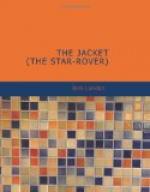“Now, professor, how do I know all this stuff about kimchi? It is not in the content of my mind.”
“But it is,” I exulted. “I put it there.”
“All right, old boss. Then who put it into your mind?”
“Adam Strang.”
“Not on your tintype. Adam Strang is a pipe-dream. You read it somewhere.”
“Never,” I averred. “The little I read of Korea was the war correspondence at the time of the Japanese-Russian War.”
“Do you remember all you read?” Oppenheimer queried.
“No.”
“Some you forget?”
“Yes, but—”
“That’s all, thank you,” he interrupted, in the manner of a lawyer abruptly concluding a cross-examination after having extracted a fatal admission from a witness.
It was impossible to convince Oppenheimer of my sincerity. He insisted that I was making it up as I went along, although he applauded what he called my “to-be-continued-in-our-next,” and, at the times they were resting me up from the jacket, was continually begging and urging me to run off a few more chapters.
“Now, professor, cut out that high-brow stuff,” he would interrupt Ed Morrell’s and my metaphysical discussions, “and tell us more about the ki-sang and the cunies. And, say, while you’re about it, tell us what happened to the Lady Om when that rough-neck husband of hers choked the old geezer and croaked.”
How often have I said that form perishes. Let me repeat. Form perishes. Matter has no memory. Spirit only remembers, as here, in prison cells, after the centuries, knowledge of the Lady Om and Chong Mong-ju persisted in my mind, was conveyed by me into Jake Oppenheimer’s mind, and by him was reconveyed into my mind in the argot and jargon of the West. And now I have conveyed it into your mind, my reader. Try to eliminate it from your mind. You cannot. As long as you live what I have told will tenant your mind. Mind? There is nothing permanent but mind. Matter fluxes, crystallizes, and fluxes again, and forms are never repeated. Forms disintegrate into the eternal nothingness from which there is no return. Form is apparitional and passes, as passed the physical forms of the Lady Om and Chong Mong-ju. But the memory of them remains, shall always remain as long as spirit endures, and spirit is indestructible.
“One thing sticks out as big as a house,” was Oppenheimer’s final criticism of my Adam Strang adventure. “And that is that you’ve done more hanging around Chinatown dumps and hop-joints than was good for a respectable college professor. Evil communications, you know. I guess that’s what brought you here.”
Before I return to my adventures I am compelled to tell one remarkable incident that occurred in solitary. It is remarkable in two ways. It shows the astounding mental power of that child of the gutters, Jake Oppenheimer; and it is in itself convincing proof of the verity of my experiences when in the jacket coma.




